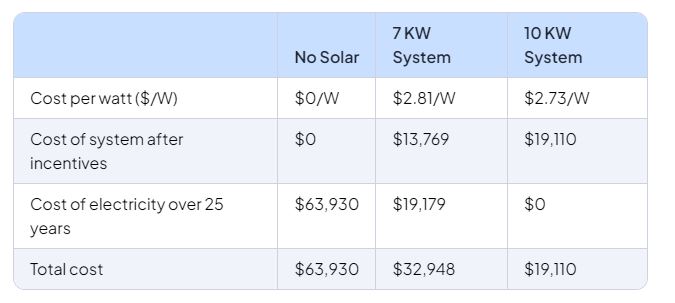Solar Power Notes
Last updated October 11, 2024
By Emma Howland
Terms/Specs
A kilowatt hour (kWh) is a unit of energy that represents the amount of electricity used by a device that consumes 1,000 watts over the course of an hour. To put it simply, if you have a 100-watt light bulb, it would take 10 hours to consume one kWh of energy.
Solar Cell average size of a solar panel cell is 6″x6″
60-Cell Solar Panels: The standard solar panel size, the 60-cell is structured as a 6×10 grid and measures 3.25 feet by 5.5 feet. These panels typically produce between 250-400 W each.
72-cell solar panels: Typically used in commercial solar projects, are larger because they have an extra row of cells. They’re around 7.5 feet tall by 3.7 feet wide.

Weight The weight of the panel, depending on the solar cell structure, materials, and required mounting accessories, can be between 40 and 60 pounds. They add about 2.8 pounds per square foot on a pitched roof and about 5 pounds per square foot on a flat roof.
If you see panels with 120 cells, this usually means the cells are split in half, called half-cut technology, which can increase efficiency. These are becoming more popular in both home and commercial solar installations.
Savings

According to the U.S. Energy Information Administration, the average monthly electricity consumption for a residential utility customer is about 903 kWh per month.
Divide your average monthly usage by 30 days in a month to get your daily usage. If you’re going by the national average, then you should be using about 30 kWh per day. Next, figure out the average amount of sunlight you get per day. The US ranges from about 4 hours – 6 hours of sunlight per day, on average, see the below map. Let’s estimate you get about five hours per day to generate that 30 kWh you use. So the kWh divided by the hours of sun equals the kW needed. Or, 30 kWh / 5 hours of sun = 6 kW of AC output needed to cover 100% of your energy usage.
Next, we factor in energy loss because Solar panels produce direct current (DC), and your home runs on alternating current (AC).
Losses in converting the energy from the sun into DC power, and turning the DC power into AC power. This ratio of AC to DC is called the derate factor, and is typically about 0.8. This means you convert about 80% of the DC power into AC power.
To figure out how many kilowatt-hours (kWh) your solar panel system puts out per year, you need to multiply the size of your system in kW DC times the .8 derate factor times the number of hours of sun. So if you have a 7.5 kW DC system working an average of 5 hours per day, 365 days a year, it’ll result in 10,950 kWh in a year.

City of Seattle FAQs
- A residential solar electric system installed in an unshaded area typically generates about 1,000 kilowatt-hours (kWh) per year for each kW installed.
- Currently in Seattle, the average residential solar electric system size is 8 kW. This represents an investment of about $24,000 before incentives or taxes.
- The average US residential solar installation is 5 kW. If we assume 250 watt panels, this means that the average solar home has about 20 solar panels.
Steps to Solar Installation:
- Assess property and current electric service to ensure existing equipment meets code requirements
- Get bids and choose a solar contractor
- Apply for interconnection with City Light. You will need to submit a:
- Level 1 Interconnection Agreement
- Solar One Line
- If you are planning an installation in a network area, your installation has battery backup, or your installation is larger than 10 kW, your application will be reviewed by our Network Engineering Department, which can add additional time to the interconnection approval process. Network installations may also require special equipment.
- If you have multiple meters on your property or own two contiguous properties and are interested in net metering aggregation, submit a Meter Aggregation Application.
- Obtain permits for your system through your local permitting jurisdiction.
- Claim your renewable energy tax credit on your next federal tax return.
Recent Posts
Categories
- Accessibility (2)
- Annotation Templates (1)
- Building Code (6)
- Calculation Templates (2)
- Civil Engineering (3)
- Derivations (8)
- Drafting Standards (18)
- Energy Code (1)
- Geotechnical Engineering (2)
- IT & Software Setup (5)
- Land Use Code (1)
- Product Knowledge (9)
- Production Tutorial (7)
- Research Notes (9)
- Research Tips (1)
- Revit Families (2)
- Revit Tips (5)
- Standard Operating Procedures (6)
- Stormwater (4)
- Structural Calculators (4)
- Structural Engineering (30)
- Structural General (11)
- Uncategorized (29)